Just got your lawn mower out of storage and having no luck getting it started? There are a few different reasons why this could be happening – and we’ve shared them all in this helpful guide.
Your first instinct might be to contact a professional, but many of the issues that prevent a mower from stating can be fixed by the operator.
Jump to your lawn mower type and learn the most common reasons why it isn’t starting.
✅Key Takeaways:
An electric lawn mower might not start if there’s a fault with the extension lead or the power cord, the motor is burned out, the grass box is full, the safety handle isn’t engaged, or the blades are clogged.
A petrol lawn mower might not start if the fuel is low, there are spark plug issues, the air filter is clogged, or the carburetor is dirty.
A battery lawn mower might fail to start if the battery is damaged or failing, the battery charger is broken, or there are wiring or motor problems.
A robot lawn mower might be unable to start if the wheels are jammed, the battery has failed, or the charging station isn’t receiving power.
Table of Contents
📑 8 Reasons Why An Electric Lawn Mower Won’t Start
Here are the 8 common reasons why an electric lawn mower might fail to start.
| Problem Description | How To Resolve |
|---|---|
| Fault with the Extension Lead |
|
| Damaged Cord |
|
| Burned-Out Motor |
|
| Plug Out of Socket |
|
| Tripped Breaker or Blown Fuse |
|
| Grass Box Full |
|
| Safety Handle Not Engaged |
|
| Jammed Blades |
|
🔌 Problem 1: A Fault With The Extension Lead
The first potential cause of an electric mower not starting is a problem with the extension lead.
You might plug your mower into an extension cord to give you some extra length for getting across your lawn. If your extension cord is faulty or damaged, it won’t supply power to the mower, so the mower won’t start.
How To Resolve
Try plugging your lawn mower straight into the power outlet, rather than the extension cord.
If the mower starts, buy a new extension cord to use instead of the faulty one and try again.
If the mower still won’t start, move on to the next possible cause.
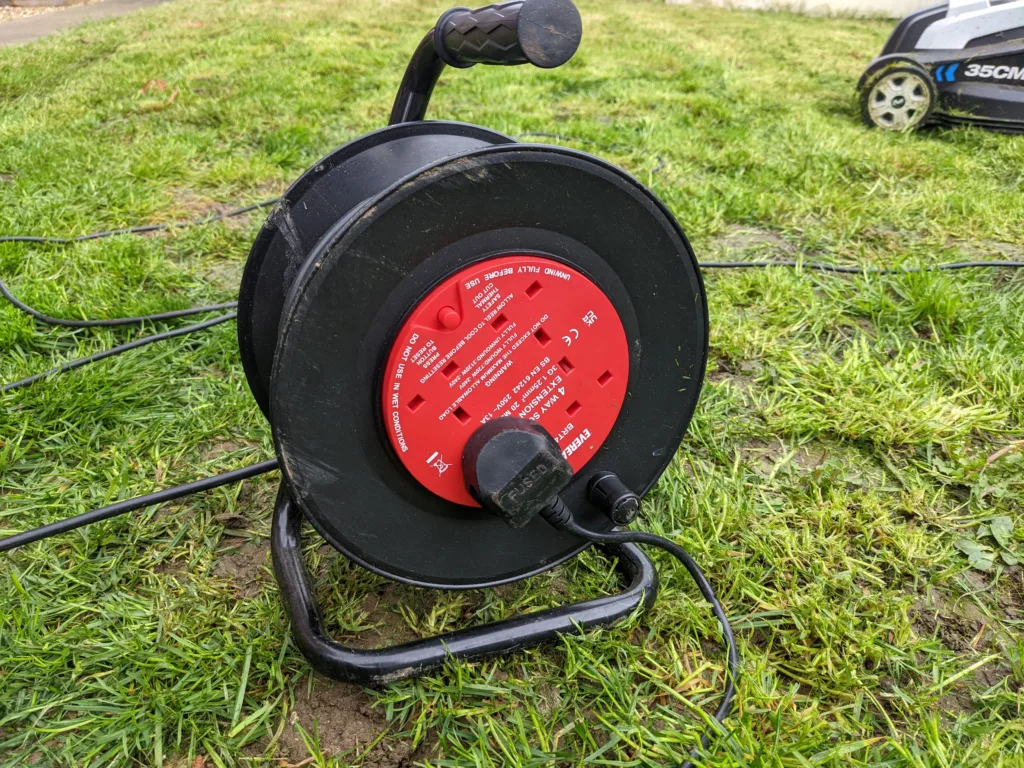
😵 Problem 2: A Damaged Cord
The mower’s own power cord might also be the reason why the machine won’t start.
If you keep your mower in a shed or outhouse between uses, mice might chew at the cord, causing it to become frayed or develop a hole.
Your mower’s cord will gradually become worn over time, especially if the mower is used heavily. Incorrectly handling the cord, including pulling, flexing, and pushing the cable, could also cause internal damage.
How To Resolve
Inspect the cord for signs of visual damage, paying particular attention to where the cord meets the mower, and where the cord joins the plug.
If you notice fraying or any other signs of wear, you probably need to repair or replace the cord.
Check your user manual to see if the manufacturer gives instructions on how to do this.
In many cases, a professional electrician will be needed to fix the cord. Contact the manufacturer if you need more advice.
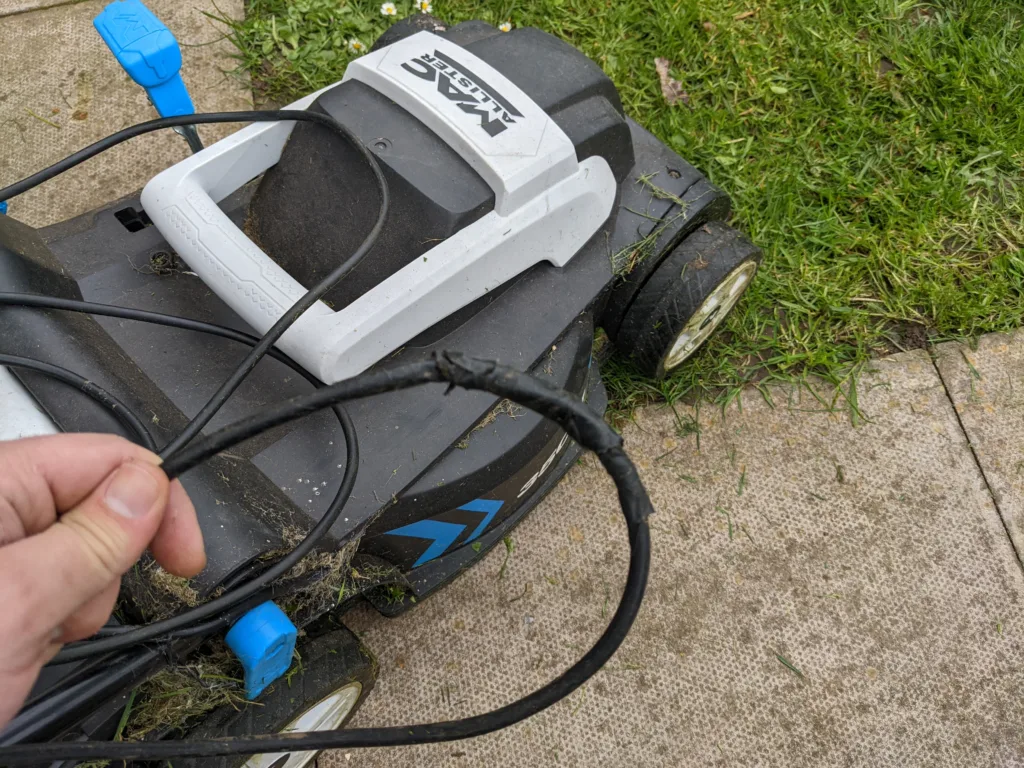
🔥 Problem 3: Burned-Out Motor
If your mower is old and you’ve used it excessively or inappropriately, it might not start due to a burned-out motor.
Electric mower motors last for 7-13 years on average; sometimes even longer with proper care.
But certain mowing situations, such as cutting very long grass, cutting grass too fast, or cutting damp grass, will put strain on the motor, increasing its risk of premature burnout.
How To Resolve
A burned-out motor is something that you’ll probably diagnose while you’re mowing, because it often leads to smoking and an unpleasant burning smell.
If your motor has burned out and you’re no longer within your mower’s warranty period, you have a couple of options:
Contact a professional mower repair company to repair or replace the motor
Buy a new mower
In most cases, unless your mower is only a couple of years old, we’d recommend buying a new model. You’ll probably spend more on fixing a burned-out motor than you would on buying a new mower in perfect condition.
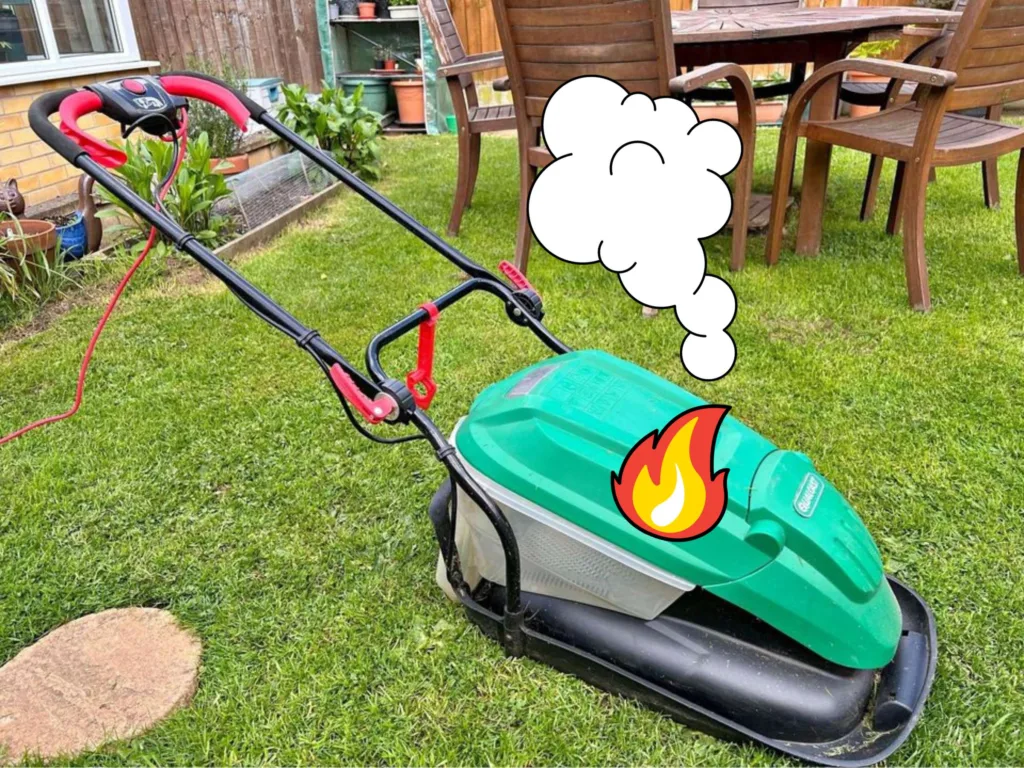
🔌 Problem 4: The Plug Has Come Out Of The Socket
If you try to turn on your electric mower mid-mow, only to discover that it won’t start, you might have unknowingly pulled the plug out of the socket.
This is especially likely if the power cord is being stretched to its limit.
How To Resolve
Switch the mower off and check that the plug is still pushed all the way back into the socket.
If it isn’t, push it in and attempt to restart your mower. The issue should now be fixed.
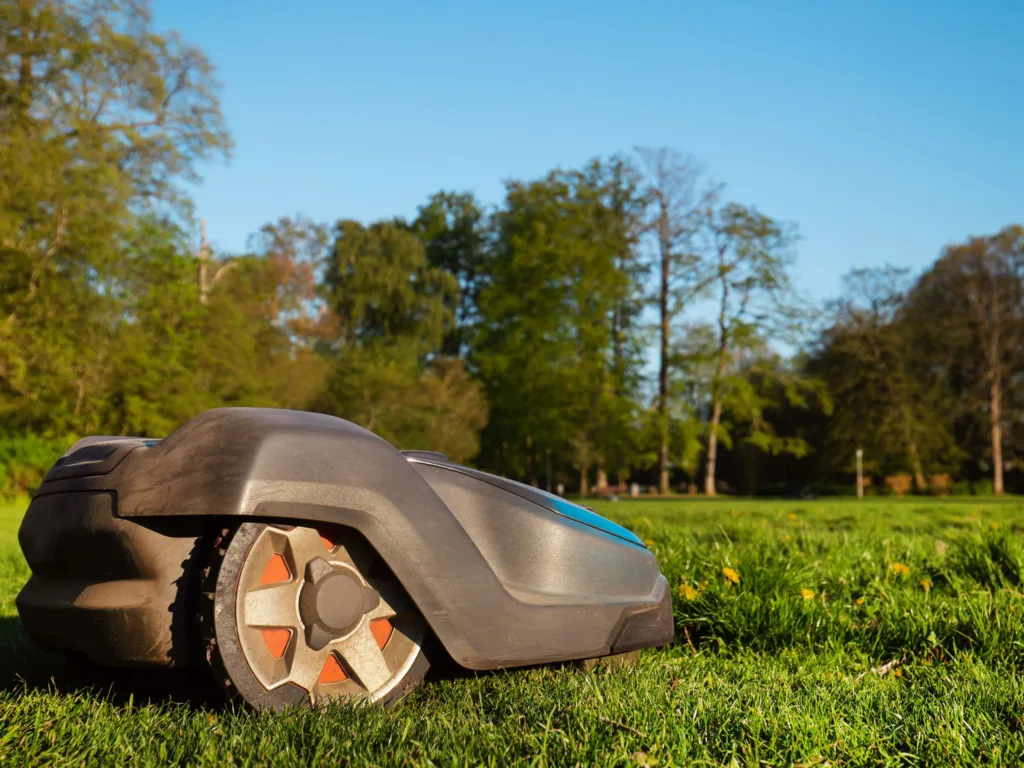
💣 Problem 5: Tripped Breaker Or Blown Fuse
Another reason why your electric lawn mower might fail to start is if there’s an issue in the mower that’s causing it to trip a breaker or blow a fuse in your home.
This is likely due to a short in the mower’s electrical circuit, likely in the motor winding, causing the mower to overheat and prompting the breaker to trip.
You’ll probably notice that your mower makes a quiet clicking noise but won’t start when you try to switch it on, and it may trip the circuit breaker every time you attempt a start.
How To Resolve
Resolving an issue with the mower’s electrical circuit is a little complex for most folks.
Your first port of call should be to contact the manufacturer and explain what’s happening when you switch the mower on, including any noises you hear or any unusual smells.
The manufacturer may be able to advise you on some easy fixes, or they may be unable to help, and you’ll either need to get the mower fixed by an electrician or buy a new one.
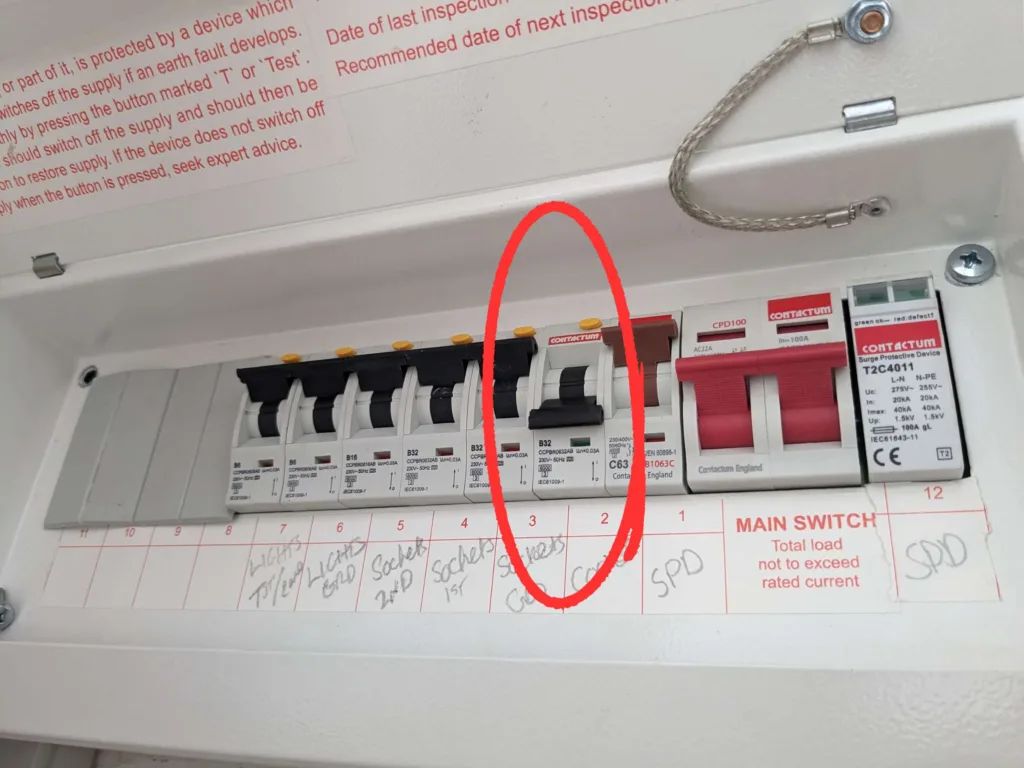
📦 Problem 6: Grass Box Full
Some electric lawn mowers have a system that prevents the machine from switching on when the collection box or bag is full of grass clippings.
The mower might cut out in the middle of mowing to prevent the full grass box from overflowing back onto your lawn.
How To Resolve
Remove the collector and empty the grass clippings, then re-attach it to the mower.
When you switch the mower on, it should now start up as normal.
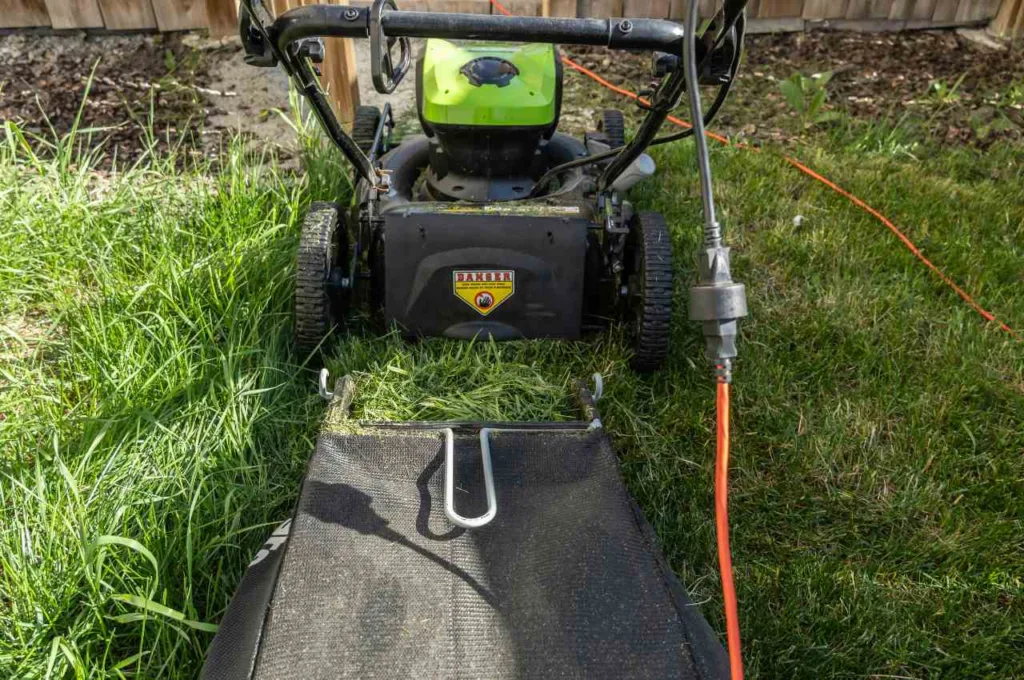
👷 Problem 7: Safety Handle Not Engaged
Most modern electric lawn mowers have a safety handle or lever that needs to be engaged while you’re mowing.
If you let go of the handle for any reason, the mower will shut off, preventing a possible dangerous outcome if you tripped or lost control and the blades continued to spin.
If you’ve never used a lawn mower before, you might not realize that you have to push down on the lever or handle while switching it on. If you don’t, the mower won’t start up.
How To Resolve
Make sure to grip the safety handle firmly when you’re starting up your mower, and keep hold of this handle while you’re mowing.
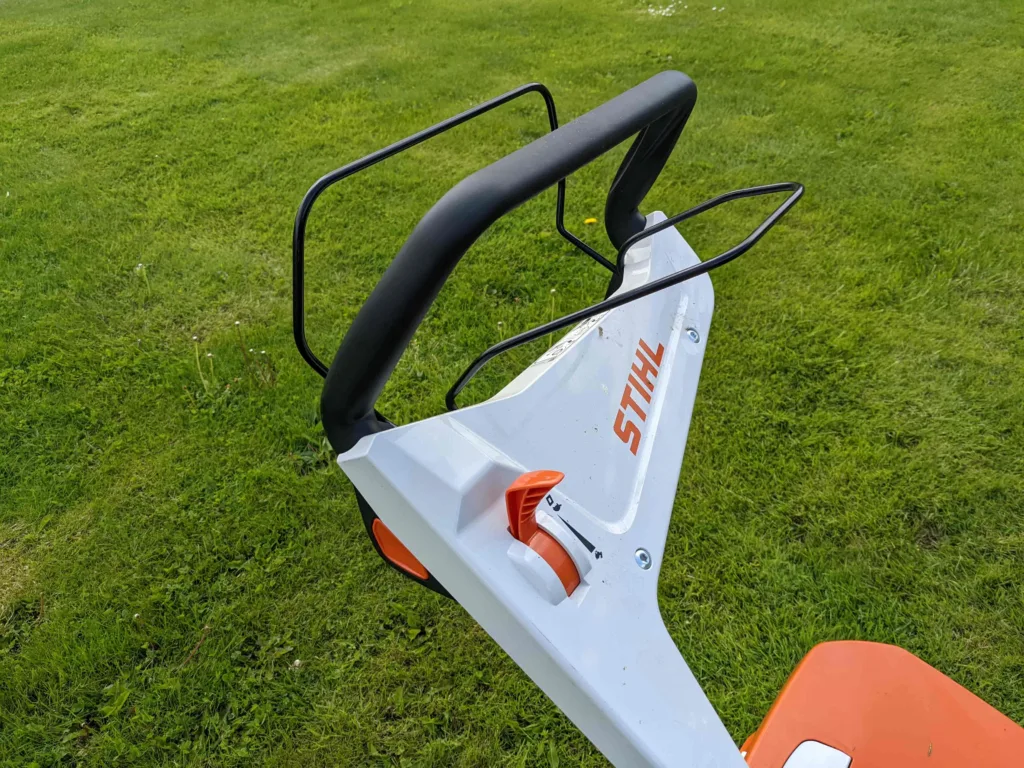
✂️ Problem 8: Jammed Blades
If clumps of grass, sticks, leaves, or other debris have got caught in your lawn mower’s blades, they may prevent the blades from turning.
As a result, the mower will stop working to let you know that there’s an issue that needs to be fixed.
How To Resolve
Unplug the mower and turn it on its side. If the blades are clogged with debris, soil, leaves, or plant matter, this is the likely reason why the mower won’t start.
Use a scraper to remove the debris or jet-wash the mower deck with a hose (being careful not to get water in the motor).
Once the blockage is cleared, try starting the mower again. Hopefully, it should now work.
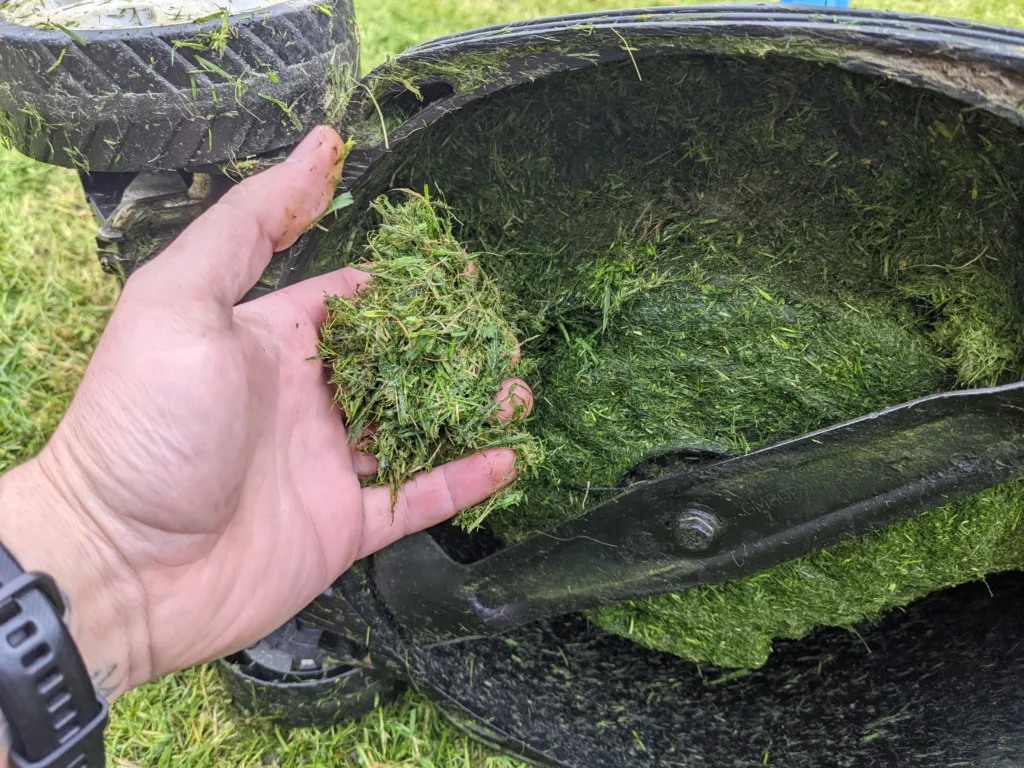
📑 8 Reasons Why A Petrol Lawn Mower Won’t Start
Here are the likely reasons why a petrol lawn mower won’t start.
| Problem Description | How To Resolve |
|---|---|
| Low Fuel |
|
| Spark Plug Issues |
|
| Broken Clutch |
|
| Debris In The Mower Or Flywheel Brake Problems |
|
| Clogged Carburetor |
|
| Problems With The Fuel Filter |
|
| Dirty Fuel Cap Vent |
|
| Broken Or Damaged Safety Release Cable |
|
⛽️ Problem 1: Low Fuel
Low fuel is the most likely reason why your petrol lawn mower’s engine won’t start.
It might be obvious, but it’s easy to forget to top up the fuel tank. If it’s been a while, your tank might either need more fuel, or fresh fuel. Old fuel is less potent and won’t be able to combust.
How To Resolve
Check the fuel tank and see if it needs to be topped up. If so, add more petrol until you reach the maximum fill line.
You might want to replace the old fuel with a new batch of fresh fuel if you can’t remember the last time you emptied the tank.
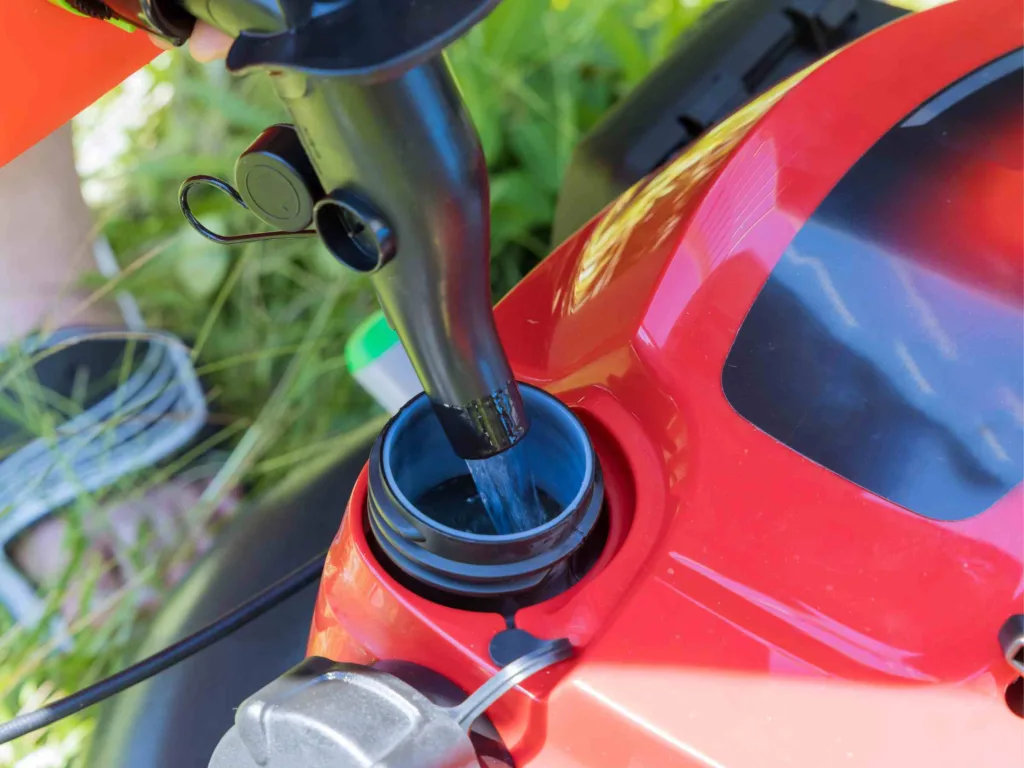
⚡️ Problem 2: Spark Plug Issues
Issues with your petrol mower’s spark plug might alsoaffect its ability to start.
A spark plug is an essential component of a petrol mower. It creates the spark that ignites the petrol, which is needed to power the mower engine.
If the spark plug is dirty, loose, or disconnected, it may be unable to produce sparks, and the mower will fail to start.
How To Resolve
Remove the spark plug and inspect it for debris, excess moisture, or grease. Clean the plug, then reinsert it and try to start the lawn mower’s engine again.
Most lawn mower manufacturers sell spark plugs, so if you need a new one, you have plenty of choice.
Just make sure the spark plug you buy is compatible with your mower’s engine, or you’ll end up further damaging the mower. Check your user manual if you’re not sure.
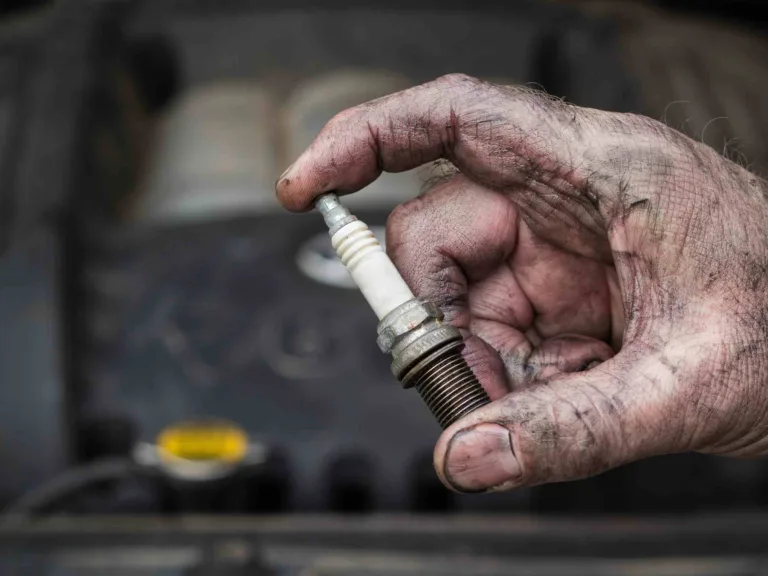
🧰 Problem 3: Broken Clutch
If your mower engine starts but the blades won’t spin, you might have a problem with the clutch.
The clutch transfers engine power to the blades, so if the clutch doesn’t work, the blades won’t spin properly.
How To Resolve
You might be able to DIY fix the clutch if you’re a handy person with some experience in mechanics.
Otherwise, contact a lawnmower repair company and ask how much a professional clutch repair or replacement will cost.
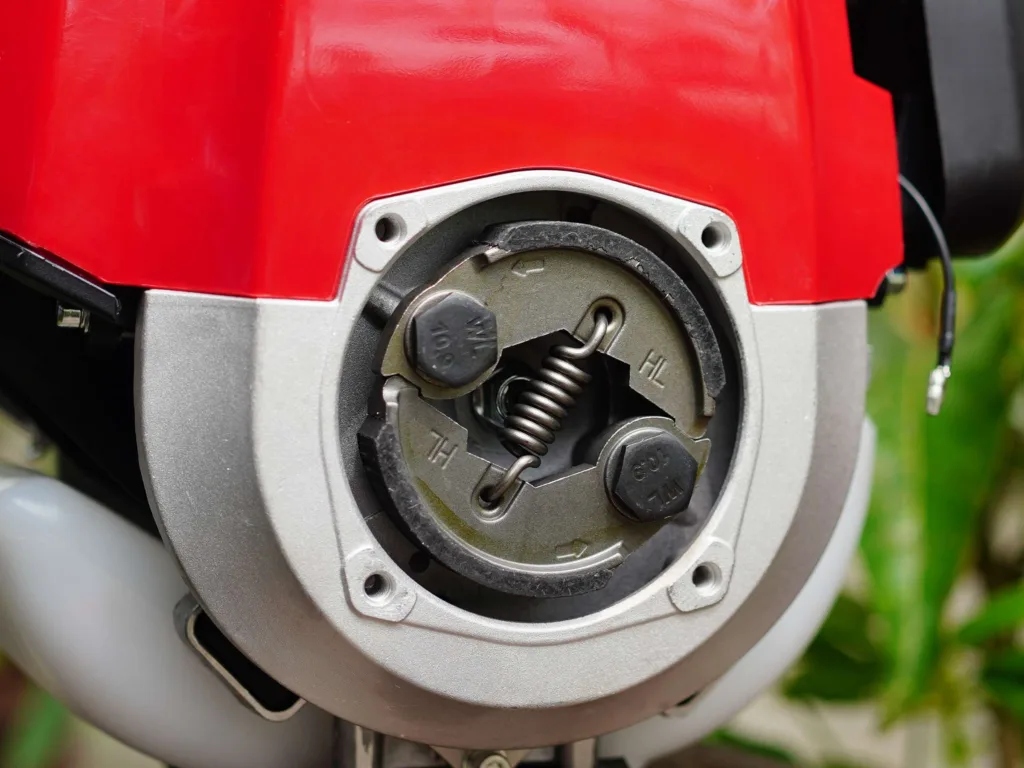
🍃 Problem 4: Debris In The Mower Or Flywheel Brake Problems
If your mower’s starter rope is stuck or very hard to pull, you might have an issue with debris stuck in the underside of the mower deck, or problems with the flywheel brake.
How To Resolve
First, make sure the flywheel brake isn’t the problem. Check that the brake is pressing against the handle before you try the starter rope again.
If this doesn’t resolve the issue, check for debris in the mower.
Make sure the mower is fully switched off, then put it on its side to examine the deck. Put it on the correct side to avoid the contents of the petrol tank leaking onto your lawn.
Use a trowel or a scraper to scrape away any large clumps of dirt and grass that might be causing a blockage.
Once the mower deck is clean, put the mower back on all four wheels and try switching it on again.
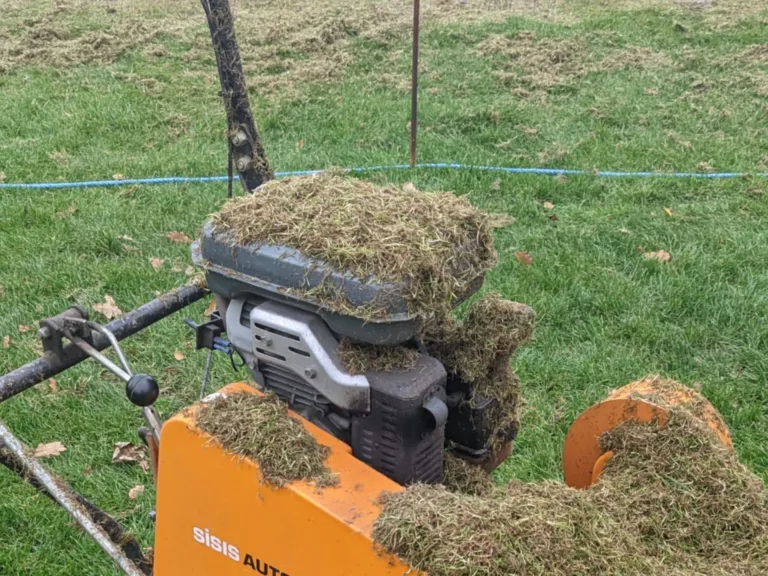
🛢 Problem 5: Clogged Carburetor
Another possible cause of a petrol mower that won’t start, or a mower that starts and then cuts out, is a clogged or dirty carburetor.
The role of a mower carburetor is to mix the fuel with air, allowing for proper combustion.
If the engine doesn’t receive the right mixture of air and fuel, it’ll fail to ignite, preventing the mower from starting up.
How To Resolve
Check the air filter in the carburetor for dirt, debris, and clogging.
The air filter may be coated with leftover petrol from the fuel tank, preventing it from being able to draw air.
Clean the air filter or buy a new filter if necessary. We don’t recommend using compressed air close to the engine, since this will force debris into inaccessible areas.
Also check that the carburetor is properly attached. A poor seal will cause air to leak out of the machine after it has been drawn in.
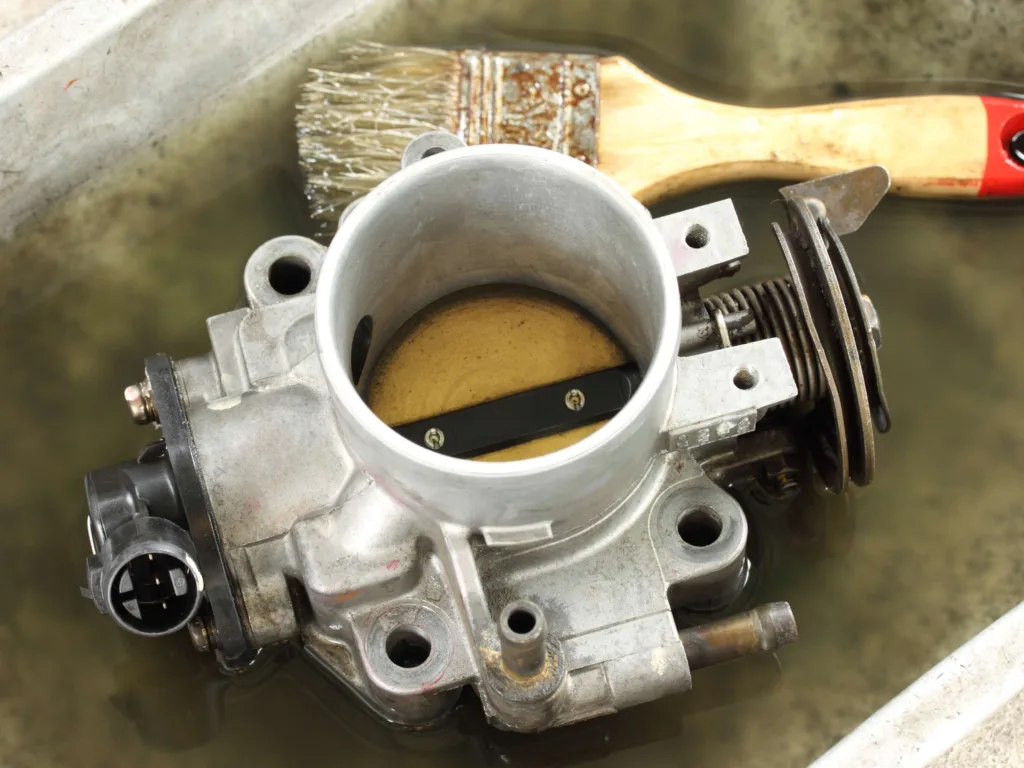
🧽 Problem 6: Problems With The Fuel Filter
A lawn mower’s fuel filter prevents particles from the air from getting into the engine’s combustion chamber.
If the fuel filter is old, worn, or clogged, it may cause the engine to sputter or prevent the engine from starting at all.
How To Resolve
Check that the fuel filter is functioning properly by conducting a visual inspection.
Remove the fuel line (before the fuel filter inlet). If you notice petrol running out freely, you likely have an issue with the filter.
Check your user manual for instructions on how to replace the fuel filter.
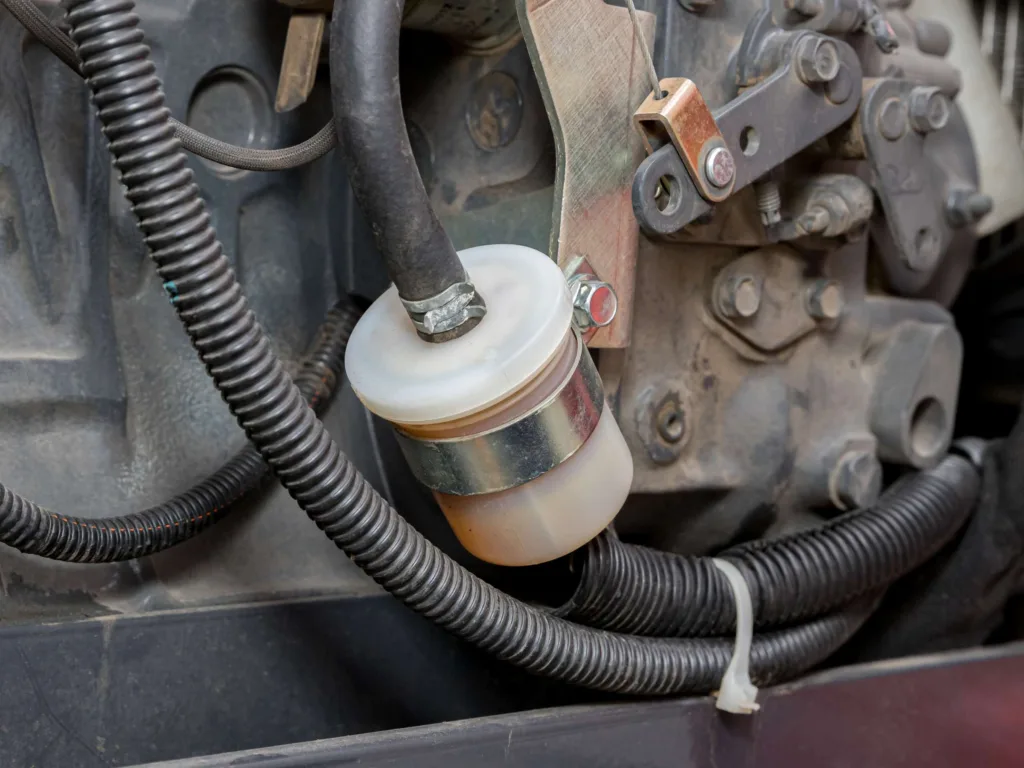
🛢 Problem 7: Dirty Fuel Cap Vent
If your petrol lawn mower starts fine, but it cuts out after a few minutes, and the engine sputters and dies when you try to pull the cord, you might have a fuel cap vent issue.
The fuel cap vent releases pressure inside the machine, so that fuel can flow into the carburetor from the tank.
If the fuel can’t vent properly, fumes will build up inside the tank, creating a vacuum that’s eventually strong enough to prevent fuel from flowing out.
How To Resolve
Remove the fuel cap from the tank, which will break the vacuum. Put the fuel cap back on and try to start the mower again.
If the fuel cap vent was the problem, the engine should start immediately. Otherwise, you’re likely dealing with another issue.
The vent may continue to create issues in the future, so buy a new fuel cap if needed.
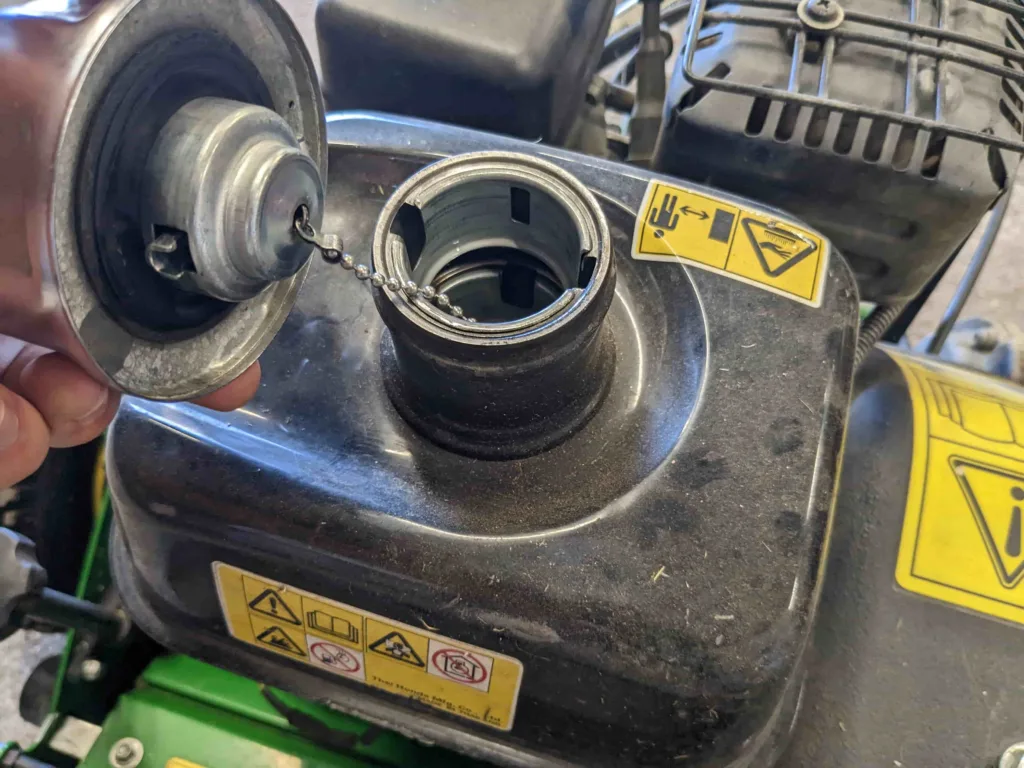
🧷 Problem 8: Broken Or Damaged Safety Release Cable
Your mower’s safety lever or bar needs to be engaged at all times while you’re using the mower. When you let go of the lever, the mower engine will cut off.
The lever is connected to the mower engine via a metal cable. If this cable is damaged or broken, it may cause the engine to react as if the safety lever is engaged when it isn’t.
How To Resolve
You can resolve this issue by replacing the safety release cable. Contact the manufacturer to find out which parts you need for the job.
If the manufacturer doesn’t sell cables, you might be able to use a cable for another mower.

📑 5 Reasons Why A Cordless Lawn Mower Won’t Start
Here are some of the reasons why a cordless or battery-powered lawn mower won’t start.
| Problem Description | How To Resolve |
|---|---|
| Battery Needs Charging |
|
| Damaged Or Failing Battery |
|
| Bad Connections |
|
| Wiring And Motor Problems |
|
| Clogged Blades |
|
🪫 Problem 1: Battery Needs Charging
The most common reason why a cordless lawn mower won’t start is that the battery needs charging.
You’ll need to charge the battery before every use, even if the battery is partly or fully charged at the end of your previous use.
Like any batteries, lawn mower batteries drain over time, and a battery will become completely drained after around 3-4 weeks – regardless of whether or not you’ve used it.
How To Resolve
Resolve the issue by charging the mower battery within 24 hours before you plan to mow.
If the battery drains immediately after charging, it may be damaged or failing (see below).
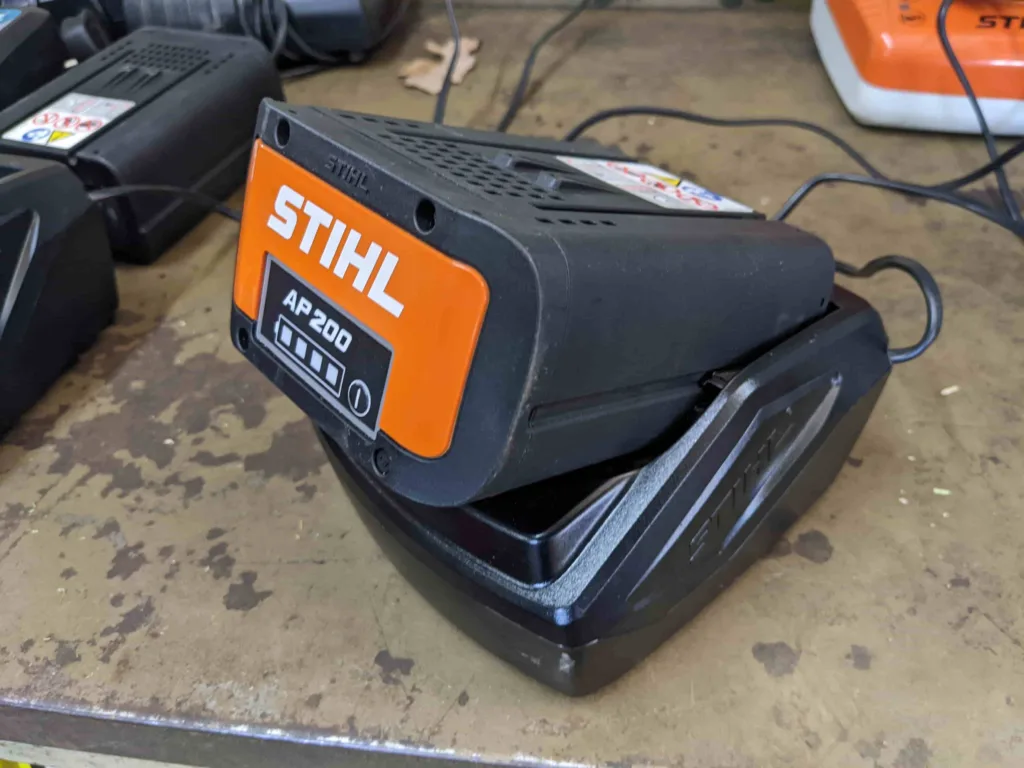
🔨 Problem 2: Damaged Or Failing Battery
Lawn mower batteries last around 3-5 years. After this time, your batteries may be unable to hold a charge for long enough to mow your lawn, or they might not charge at all.
Certain conditions can also damage a mower battery. For instance, exposing the battery to extreme heat, cold, or damp conditions may cause permanent damage that prevents the battery from charging.
In this case, your mower might not start even when the battery has had a full charge.
How To Resolve
You usually can’t repair a damaged or failing mower battery – the easiest resolution is to buy a new battery.
You can buy new mower batteries online, either directly from the manufacturer or from marketplaces like Amazon. Make sure the battery is the right size and power for your mower before you spend your money.
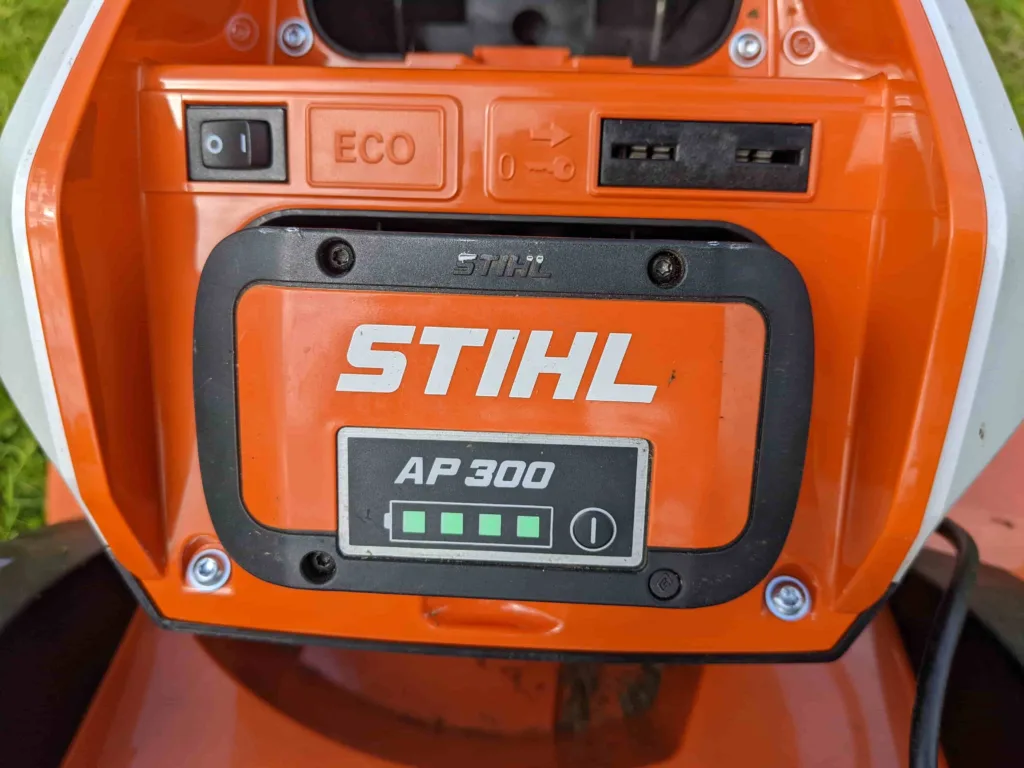
🧲 Problem 3: Bad Connections
A mower battery will only charge if the connection between the mower’s charger, the charging port, and the wall outlet is set up properly. If it isn’t, this could be the reason why your lawn mower isn’t starting.
The charger could also be damaged, preventing it from supplying energy to charge the battery.
How To Resolve
Check that the contact between the outlet and charger is secure. The charger will probably have a light indicator that tells you when it’s charging, and the battery’s charging status.
Also inspect the charger unit and wires to make sure there are no signs of visible damage. Not all damage is visible, so use a volt meter to see if the charger is still supplying energy.
If there’s a problem with the connections or another fault that can’t be easily resolved, you may need to buy a new battery charger.
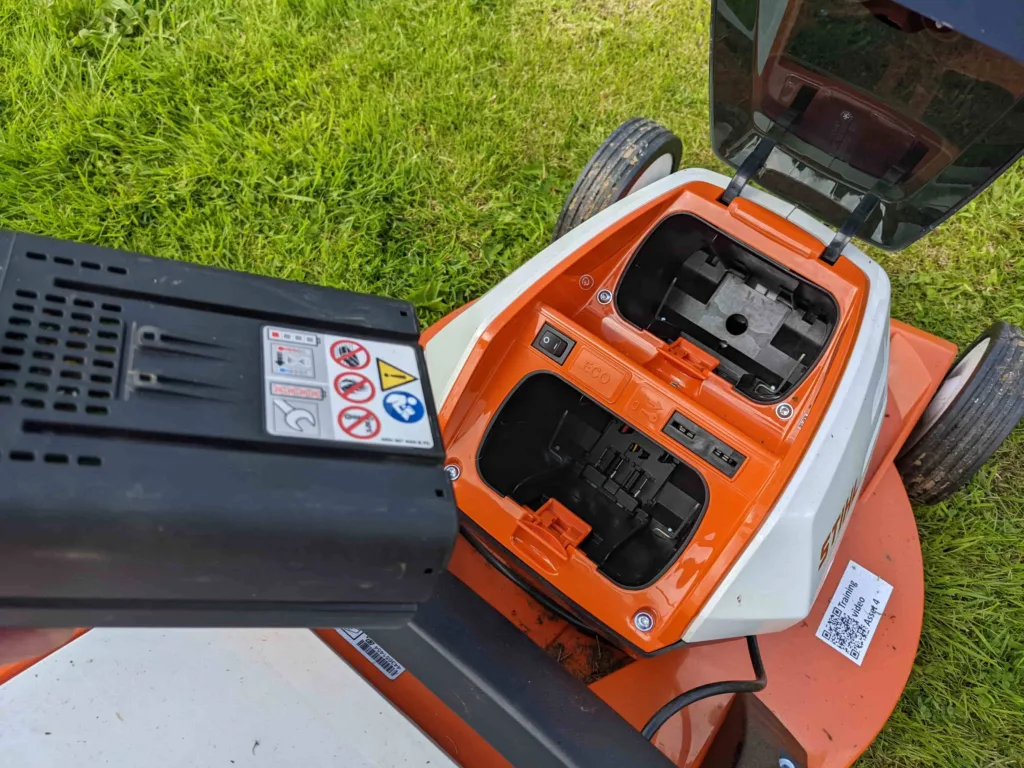
🖇 Problem 4: Wiring And Motor Problems
As with an electric lawn mower, a battery-powered lawn mower might not start if there are issues with the motor.
A burned out motor will fail to start when you attempt to switch the mower on. If the motor failed during your last mow, you probably noticed gray or black smoke and an unpleasant smell.
A pinched, damaged, or loose wire is another common problem that could cause your battery lawn mower to fail to start.
How To Resolve
As we advised earlier, we recommend replacing your mower if it has a burned-out motor and you’re no longer within the warranty period. It’s typically cheaper to replace the mower with a better model than to buy a replacement motor.
Use a volt meter to check for damaged or loose wires, especially around the mower’s handles at the folding point, where they’re likely to get pinched from your grip.
If you can’t safely or confidently repair your mower’s wiring, check your mower’s warranty terms, and contact customer service if the warranty is still valid. Otherwise, consider taking the mower to a specialist repair company.
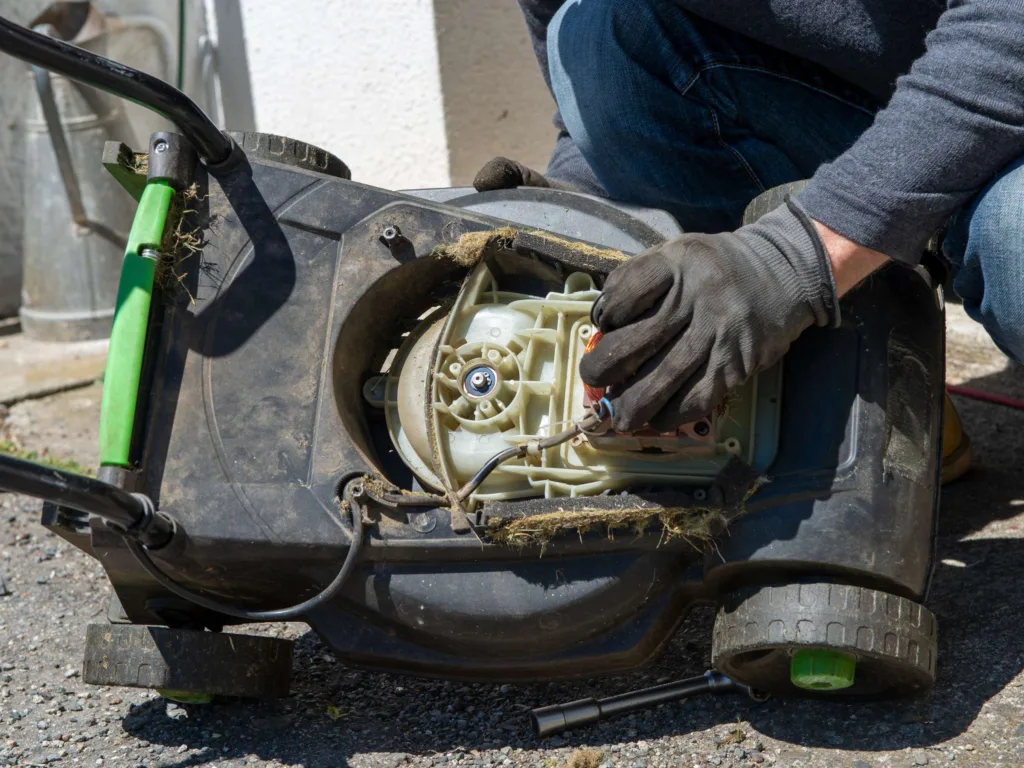
✂️ Problem 5: Clogged Blades
Another issue that could prevent a battery-powered mower from starting is clogged or jammed blades.
We’ve mentioned this issue in the “electric mower” troubleshooting section, so we’ll keep this brief.
If debris clogs your mower’s blades, it may prevent them from spinning – especially for a cordless mower, which has a less powerful motor than an electric model.
The mower may fail to switch on until you remove the obstruction.
How To Resolve
Resolve this issue by removing the cause of the clog or jam.
You might need a scraping tool if the blades are clogged by caked-on grass or stubborn soil stains.
A jet hose will also clear debris quickly, but make sure to get the water nowhere near the battery or wires.
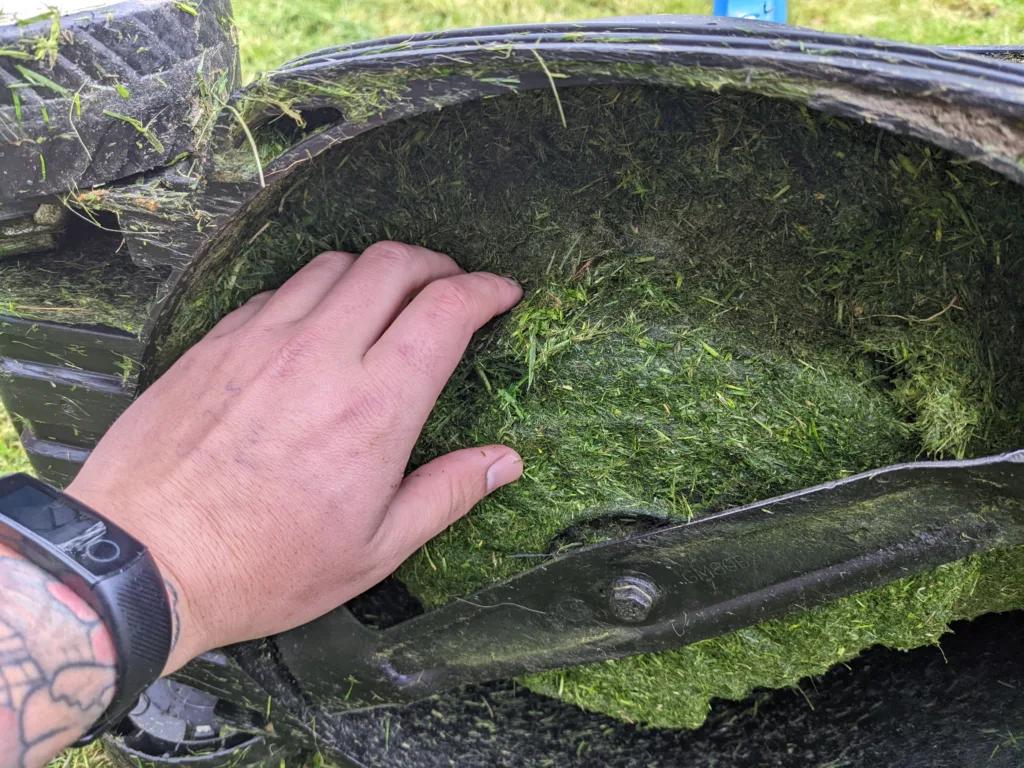
📑 4 Reasons Why A Robot Lawn Mower Won’t Start
Here are some of the possible reasons why a robot lawn mower won’t start.
| Problem Description | How To Resolve |
|---|---|
| Charging Station Not Receiving Power |
|
| Failed Battery |
|
| Jammed Wheels |
|
| Programming Issue |
|
🏠 Problem 1: Charging Station Not Receiving Power
One likely cause of a robot mower that fails to start is if the charging station isn’t receiving power.
Robot mowers are battery-operated, and they need to recharge their batteries between uses. Your mower should head automatically to its charging station after mowing your lawn, but if the charging station has no power, the mower won’t charge.
How To Resolve
Check that the cable is connected, both at the power outlet and the charging station, then check that you have a live connection.
If the cable is damaged, you might need a new one. Or, if the charging station’s electronics are damaged, you’ll need to buy a new station.
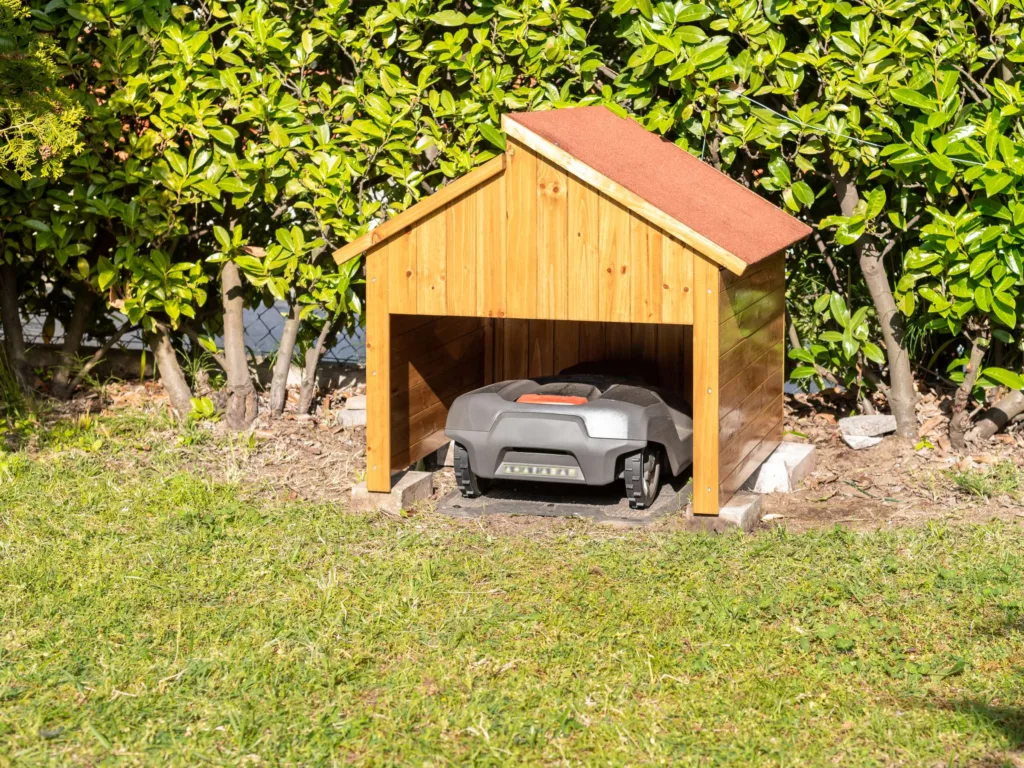
🪫 Problem 2: Failed Battery
A failed battery is another possible reason why a robot mower won’t start.
An old battery may be worn out, which means it’ll lose charge quickly or be unable to charge at all, causing the mower to shut down mid-operation or fail to start.
How To Resolve
Check that the charger is working. If it is, but the battery still won’t charge, replace the battery with a new one.

⚪️ Problem 3: Jammed Wheels
Robot mowers use battery-powered motors to turn their wheels.
If your mower’s wheels are blocked or jammed with debris, the mower won’t be able to move forward, which may cause it to shut off or fail to start.
How To Resolve
Check to see if the wheels are an issue by lifting the mower and attempting to turn the wheels with your hand.
If any of the wheels don’t turn, or if they only turn when you apply a lot of pressure, there’s probably a blockage.
Check all around the wheel arch for leaves, grass, sticks, grass clumps, mud, or anything else that could be jamming the wheel. Carefully remove the debris with a toothbrush, a butter knife, or another long, thin object.

💻 Problem 4: Programming Issue
A programming issue might be the reason why your robot lawn mower isn’t starting.
You should have programmed your mower during setup, or retained its factory settings. Some robot mowers allow you to program the mower to take a break or lock the device, preventing it from mowing your lawn as it usually would.
The mower might have also suffered an electrical malfunction that has affected its programming. This is especially likely if the mower has been exposed to extreme weather conditions.
How To Resolve
You can resolve an issue with programming by checking the mower’s settings and resetting it if necessary.
If the mower’s electrical parts have been damaged, you’ll need to contact an electrical specialist to see if the mower can be repaired. Otherwise, you might have no choice but to replace the mower with a new one.

🏁 Final Word
Hopefully, you should have now identified the reason why your lawn mower won’t start.
If the issue persists and you can’t fix it with the advice in this guide, contact the mower’s manufacturer and tell them, in as much detail as possible, about the problem you’re dealing with.
They might be able to help you resolve the problem, or you might have to buy a new mower.
FAQ
What are the most common reasons lawn mower won’t start?
Some of the common reasons why lawn mowers won’t start are low fuel, a broken clutch or broken gears, issues with spark plugs, and a dirty air filter.
Why won’t my lawn mower start after sitting?
If your lawn mower won’t start after sitting for a few weeks or months without use, the most likely reason is a dirty carburetor.
What would cause a lawn mower not to fire?
The most likely reason why your lawn mower won’t fire is if the spark plug is loose, dirty, or disconnected. Inspect the spark plug, clean it if necessary, and reconnect and tighten it in the mower. This should resolve the issue.
Will my mower stop working on tall grass?
Yes, long or tall grass can often cause a lawn mower to stop working. Your lawn mower should start as normal, but if the cut height is too low and you’re attempting to cut overgrown grass, the resistance might cause the mower blades to stall. You can fix the issue by raising the height of cut.
